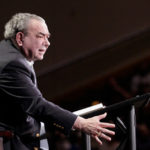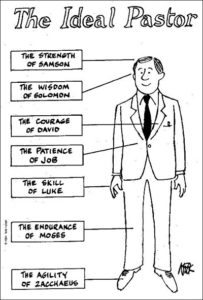 Article by Dr. R. C. Sproul: What Does It Mean to Be a Shepherd Over the Flock? (original source here)
Article by Dr. R. C. Sproul: What Does It Mean to Be a Shepherd Over the Flock? (original source here)
When we examine life in the early Christian church, we see a remarkable phenomenon recorded for us in the book of Acts. In Acts 8:1 we read, “At that time a great persecution arose against the church which was at Jerusalem; and they were all scattered throughout the regions of Judea and Samaria, except the apostles. And devout men carried Stephen to his burial, and made great lamentation over him.”
A little bit later in the text we read these words: “Therefore those who were scattered went everywhere preaching the word” (Acts 8:4). We notice here that the people described as going everywhere preaching the Word were not the apostles. They were the laity of the first-century church. The apostles remained in Jerusalem and were not numbered among those who fled during the great persecution.
It is obvious from this text in Acts that one of the functions of the leaders of the early church was to equip the laity so that the ministry of the gospel could be effected through their labors. This was a precursor of what Luther had in mind in the sixteenth century when he advocated the doctrine of the “priesthood of all believers.” In that doctrine, Luther did not intend to obscure the distinction between laity and clergy but simply intended to point out that all Christians are to be involved in fulfilling the mission of the church.
At the same time, the New Testament makes it clear that there are those appointed to be leaders in the local church, and they are called by various names, but in the main we think of the pastor as the leader of the local church. The supreme paradigm, or model, for pastoral ministry is seen in the work of Jesus Himself.
One of the titles that the New Testament bestows upon Him is that of the Good Shepherd. The metaphor of the shepherd who cares for his flock becomes then the metaphor that defines the work of the local pastor. But what does it mean to be a shepherd over the flock?
In the first place, to be a shepherd over the flock of sheep means that it is the shepherd’s responsibility to lead the sheep. If anyone has observed the behavior of sheep who are left unguided, without the care and constant supervision of a shepherd, he is aware that sheep tend to move willy-nilly in all directions without any order to their movement. They are prone to getting lost, getting injured, and being left in a state of vulnerability unless they are cared for by a shepherd. So it is with the flock of Christ. It is the chief responsibility of the pastor, who is the shepherd, to lead the sheep.
One of the great tragedies in the church of the twenty-first century, particularly in Protestantism, is that while pastors are given the responsibility for leading their congregations, rarely do they receive a level of authority that matches that responsibility. For the most part, they are considered hirelings by the governing boards of the local church, whether it be a board of elders, deacons, or a consistory. So that the pastor, in being subordinate to the elder board, always has to keep one eye on his supervisors before he takes the reigns to lead the flock of Christ. This is one of the reasons why so many pastors have compromised the preaching of the gospel. They have been so fearful that they would lose their jobs by being bold in their preaching and passionate in their concern for the sheep that they keep one eye on the sheep and the other eye on those who hire and fire them. This is not the biblical model.
From Old Testament times beginning with Moses into the New Testament, those who were called to be elders and deacons were to be placed in a position to give aid and assistance to the shepherd, who was given the authority and responsibility to lead the flock. Some pastors are very effective in leading without that authority simply by the sheer force of their personality or the skills they have in leading.
Secondly, the shepherd is responsible to feed the sheep. This was set forth with great emphasis in Jesus’ discourse with Peter after the resurrection, when He inquired of Peter’s love for his Master. Jesus three times gave the mandate to Peter to feed His sheep — to tend the flock. Sheep without food soon grow thin, weak, emaciated, and sickly — ultimately perishing.
It is the first responsibility of the pastor to make sure that the sheep under his care are fed, nourished, and nurtured by the whole counsel of the Word of God. The New Testament rebukes the believer who is satisfied with milk and flees from serious learning of the things of God by avoiding the difficult digestion of the meat of the Word of God. But a good shepherd weans his sheep from the elemental principles of milk that is given to babes, and he gives them a diet that will cause them to become strong and fully equipped to do the ministry of the gospel. That feeding is given at the responsibility of the pastor.
Thirdly, the pastor is called to tend the flock. Following again John’s imagery from nature, when a sheep is wounded or becomes ill, it is to be noticed by the good shepherd, who takes that sheep from the flock and gives the special attention needed by the sheep to be restored to fullness of health. So it is that the good pastor is one who knows the aches, the pains, the joys, and the sorrows of each member of his congregation, so that he can tend to their needs and so that they aren’t overcome by physical maladies or by spiritual and psychological distress. He is there to encourage the sheep and to see to it that they grow to the fullness of maturity in the life of Christ, conforming to Christ’s very image.
It is the responsibility of the pastor to equip the sheep by teaching them and training them. There is a difference between teaching and training.
Teaching involves the imparting of information from one person to another.
Training requires more hands-on participation, showing someone how to master a particular skill.
It is not enough for a pastor simply to communicate information through expositional preaching or to explain the doctrines of the faith to his flock. He is also called to see to it that they are trained in certain skills necessary for growth in the faith. It is the pastor’s responsibility to teach his sheep how to pray, how to worship, how to evangelize, how to be engaged profitably in the mercy ministries of the church.
In all of these enterprises, the pastor is to mirror and reflect the ministry of Jesus Himself, who gave of Himself completely to those given to Him by the Father. So the pastor must see his congregation as a flock of sheep that is entrusted to him by the Father and by the Lord Jesus Christ, that he may help the saints become all that they can become in the ministry of the gospel.


 Article: On Knowing When to Resign by D. A. Carson, research professor of New Testament at Trinity Evangelical Divinity School in Deerfield, Illinois, and general editor of Themelios. (original source
Article: On Knowing When to Resign by D. A. Carson, research professor of New Testament at Trinity Evangelical Divinity School in Deerfield, Illinois, and general editor of Themelios. (original source  Article by Dr. Steve Lawson:
Article by Dr. Steve Lawson: Article by Melton Duncan, a ruling elder at Second Presbyterian Church in Greenville, S.C. (original source
Article by Melton Duncan, a ruling elder at Second Presbyterian Church in Greenville, S.C. (original source  How to Make an Effective Preacher – Author Unknown by Clint Archer (original source
How to Make an Effective Preacher – Author Unknown by Clint Archer (original source  The shepherd’s staff serves the dual purpose of rescuing lost sheep when their heads get caught in the hedges and fending off vicious wolves who seek to devour. In the same way, when God raises up a pastor, it is a gift to the people of God – a man who demonstrates God’s love for His sheep and yet also a man fearless when God’s people need protection. A Pastor needs both a tender and a brave heart.
The shepherd’s staff serves the dual purpose of rescuing lost sheep when their heads get caught in the hedges and fending off vicious wolves who seek to devour. In the same way, when God raises up a pastor, it is a gift to the people of God – a man who demonstrates God’s love for His sheep and yet also a man fearless when God’s people need protection. A Pastor needs both a tender and a brave heart.  I am so blessed in getting to pastor the precious people at King’s Church. However, not every pastor’s experience mirrors mine. Here is an article about Pastors and the expectations often put upon them. (original source
I am so blessed in getting to pastor the precious people at King’s Church. However, not every pastor’s experience mirrors mine. Here is an article about Pastors and the expectations often put upon them. (original source